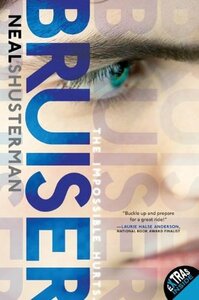Take a photo of a barcode or cover
This book was ok. I thought it got way to predictable near the end and Brewster's monologues were over written. Overall, it was compelling enough to keep going; but, not compelling enough that I would recommend it to a friend.
Shusterman has done it again by providing a compelling idea with relatable characters. I am a big fan of his other books, like Unwind and Scythe, and will be adding this one to my list to recommend to students.
The only book by Shusterman I haven't cared for was Dry, but perhaps that is because of the audio for it. I would recommend readers get a physical copy of this book to read because of the format of alternating narrators and writing styles, as well as the vocabulary word headers for each chapter. It is a short read, coming in at just a little over 300 pages, and the chapters are extremely short and the font large. Therefore, most can read it in a day or two, especially since it grips you from the onset.
I would also recommend that you read the author's "review" of it on Goodreads. It isn't an actual review, though, as he explains his writing process and reasoning for choosing this idea and the various writing styles for each character.
Bruiser is sure to be one of my Shusterman favorites for a long time because of the aforementioned reasons, but probably the main reason is the overall message it entails: "We must feel the pain of life -- physical and emotional -- in order to appreciate the joy as well. Not experiencing pain and joy and being in a cocoon of comfort is not really living."
The only book by Shusterman I haven't cared for was Dry, but perhaps that is because of the audio for it. I would recommend readers get a physical copy of this book to read because of the format of alternating narrators and writing styles, as well as the vocabulary word headers for each chapter. It is a short read, coming in at just a little over 300 pages, and the chapters are extremely short and the font large. Therefore, most can read it in a day or two, especially since it grips you from the onset.
I would also recommend that you read the author's "review" of it on Goodreads. It isn't an actual review, though, as he explains his writing process and reasoning for choosing this idea and the various writing styles for each character.
Bruiser is sure to be one of my Shusterman favorites for a long time because of the aforementioned reasons, but probably the main reason is the overall message it entails: "We must feel the pain of life -- physical and emotional -- in order to appreciate the joy as well. Not experiencing pain and joy and being in a cocoon of comfort is not really living."
Ugh this could be so much better if there was more development. If there was more 'oh wait crap I actually care about this guy as my friend' I would've loved it. It just didn't quite hit what I was hoping for.
Such an interesting concept. I picked this one up because I really enjoyed the Scythe trilogy, and I am now even more impressed with Neal Shusterman's creativity.
I almost didn't finish the book, because the beginning led me to believe this would just be another high school drama. I'm so glad I kept going, though--I've never read anything like this before. It's a story of a supernatural micropower, and that is the one point at which the reader must suspend his disbelief.
Tennyson (named for the poet) is upset and angry that his twin sister Bronte (named for the writers) is dating a ne'er do well outcast, Brewster, nicknamed "the Bruiser"--ironic, because he's never actually hurt anybody. Tenny is the one with the reputation of a bully. Brew looks the part of a bully, though, and because he's also a brooding loner, the class voted him "most likely to end up on death row" behind his back.
But he's a loner for good reason. Brewster was born with a gift that's more like a curse: he takes on the pain of those he cares about, both physical and emotional. His isolation is really protection, because once he cares for someone, he has little choice in the matter, nor do they--or so we're led to believe at first. I kept thinking that Brew was like a reimagining of Jesus, taking all our sickness and pain on the cross--except that Brewster does it all the time, and he doesn't have any sort of supernatural capacity himself. He's just this poor kid, doomed to break under the weight of the world while everyone around him gets off scot-free. Once those around him learn what he can do for them, they become selfish, manipulative monsters. He never seems to resent anyone for it, but he also has no concept of boundaries, no idea how to protect himself. Only once does he manage to refuse someone else's pain, because it would result in his death in his abusive uncle's place. But he's riddled with guilt about it afterwards.
I was wondering how such a book could possibly end. But without spoilers, I'll say the key does in fact lie in boundaries. We are (biblically speaking) to carry one another's burdens, BUT each is also to carry his own load (two different words in the Greek). This isn't a Christian book by any means, but it illustrates the biblical concept well, I thought. Brew cannot protect himself, so it's up to Bronte and Tennyson to learn how to carry their own loads, rather than allowing Brew to be a human receptacle for all their junk. But they're only motivated to do this once Brew's life is on the line. It's such a fascinating glimpse into human nature.
My rating: ****1/2
Sexual content: none
Language: some I think, but it didn't register so not a lot
Political content: none
Violence: there's some child abuse, but it doesn't go into a lot of detail
I almost didn't finish the book, because the beginning led me to believe this would just be another high school drama. I'm so glad I kept going, though--I've never read anything like this before. It's a story of a supernatural micropower, and that is the one point at which the reader must suspend his disbelief.
Tennyson (named for the poet) is upset and angry that his twin sister Bronte (named for the writers) is dating a ne'er do well outcast, Brewster, nicknamed "the Bruiser"--ironic, because he's never actually hurt anybody. Tenny is the one with the reputation of a bully. Brew looks the part of a bully, though, and because he's also a brooding loner, the class voted him "most likely to end up on death row" behind his back.
But he's a loner for good reason. Brewster was born with a gift that's more like a curse: he takes on the pain of those he cares about, both physical and emotional. His isolation is really protection, because once he cares for someone, he has little choice in the matter, nor do they--or so we're led to believe at first. I kept thinking that Brew was like a reimagining of Jesus, taking all our sickness and pain on the cross--except that Brewster does it all the time, and he doesn't have any sort of supernatural capacity himself. He's just this poor kid, doomed to break under the weight of the world while everyone around him gets off scot-free. Once those around him learn what he can do for them, they become selfish, manipulative monsters. He never seems to resent anyone for it, but he also has no concept of boundaries, no idea how to protect himself. Only once does he manage to refuse someone else's pain, because it would result in his death in his abusive uncle's place. But he's riddled with guilt about it afterwards.
I was wondering how such a book could possibly end. But without spoilers, I'll say the key does in fact lie in boundaries. We are (biblically speaking) to carry one another's burdens, BUT each is also to carry his own load (two different words in the Greek). This isn't a Christian book by any means, but it illustrates the biblical concept well, I thought. Brew cannot protect himself, so it's up to Bronte and Tennyson to learn how to carry their own loads, rather than allowing Brew to be a human receptacle for all their junk. But they're only motivated to do this once Brew's life is on the line. It's such a fascinating glimpse into human nature.
My rating: ****1/2
Sexual content: none
Language: some I think, but it didn't register so not a lot
Political content: none
Violence: there's some child abuse, but it doesn't go into a lot of detail
This was a good read, I was engaged start to finish. It lacked...something...that the Unwind books had that left me gasping for more. I liked it, but that's all. Some really interesting concepts brought up in the book.
more like 3.5 just because i was constantly mad at Bronte. but really all her actions were understandable. lol.
This is a read I would highly recommend to both boys & girls. Tennyson & Bronte are teenage twins whose parents happen to be literature professors. Tennyson is not pleased that his sister has recently started dating Brewster (aka Bruiser), the boy voted "most likely to get the death penalty". Bruiser lives with his mean, alcoholic uncle and his 8 year old brother, Cody. The family is perceived as "no good" and pretty much keeps to themselves.
Tennyson decides he is going to deliver a warning to stay away from Bronte when he sees Brewster in the locker room at school. However, as he is about to approach him, he catches sight of Brewster with his shirt off and there are horrendous bruises all over him. Thinking that Brewster's uncle is abusing him, Tennyson questions Brewster and is told "things aren't always what they seem".
Strange things start to occur around Brewster. Bronte twists her ankle while hiking with Brewster and he massages it, making the pain disappear. However, for the next several days, Brewster himself is walking with a limp. As Tennyson & Bronte become more involved in Brewster's life, it becomes clear that everyone feels much better around Brewster, but at what cost to him?
This book is intriguing, well-written and will keep you guessing to the end.
Tennyson decides he is going to deliver a warning to stay away from Bronte when he sees Brewster in the locker room at school. However, as he is about to approach him, he catches sight of Brewster with his shirt off and there are horrendous bruises all over him. Thinking that Brewster's uncle is abusing him, Tennyson questions Brewster and is told "things aren't always what they seem".
Strange things start to occur around Brewster. Bronte twists her ankle while hiking with Brewster and he massages it, making the pain disappear. However, for the next several days, Brewster himself is walking with a limp. As Tennyson & Bronte become more involved in Brewster's life, it becomes clear that everyone feels much better around Brewster, but at what cost to him?
This book is intriguing, well-written and will keep you guessing to the end.
Neal Shusterman is now one of my favorite writers!
Carefully crafted and suspenseful with characters that are complex and enjoyable. Boys and girls will both be drawn to Bruiser if they get past the first few chapters that are slow moving.




